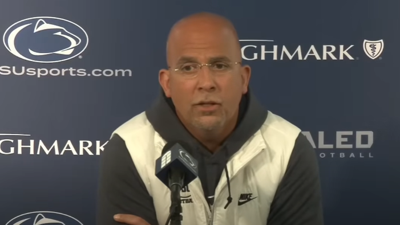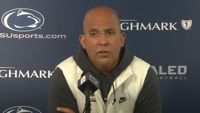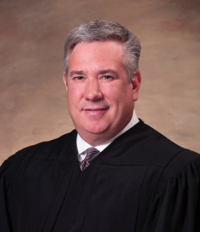
James Franklin
HARRISBURG, Pa. - Against a former football player's wishes, the locker-room culture at Penn State University will be discussed when a hazing trial against him begins next week.
Pennsylvania federal judge Matthew Brann on May 22 allowed plaintiff Isaiah Humphries to allege a culture of abuse and bullying on the team let players think it was OK to take the clothes of underclassmen and not return them and wrestle them to the ground and simulate sexual acts.
Gone but not forgotten from the case is head coach James Franklin, who is 101-42 since taking the job in 2014. The Nittany Lions nearly reached the College Football Playoff National Championship game last season.
Franklin and Penn State have won dismissal from the case, leaving Damion Barber as the last defendant standing. Barber was a defensive lineman for two seasons at Penn State before transferring in 2020.
Barber recently asked Brann to forbid Humphries from mentioning Coach Franklin "or the culture on the football team or in the locker room," arguing it wasn't relevant to any specific interactions between him and Humphries.
"Evidence showing that bullying and hazing were prevalent on the Penn State football team tends to make more probable Humphries' contentions that Barber was bullying him in the locker room," Brann wrote.
"Just the same, if the evidence suggested that there was a strict no-tolerance culture for bullying, it would tend to help Barber, and he would presumably want to introduce it."
Of course, Penn State has an awful track record of addressing misconduct on the football team. Former coach Jerry Sandusky sexually abused minors he targeted through his children's charity for years and is spending the rest of his life in prison.
The indictment against him said another coach in 2002 reported one of Sandusky's rapes to then-head coach Joe Paterno, who reported it to then-athletic director Tim Curley. The indictment said Curley and Gary Schultz, chief of Penn State's police department, never informed police. The two pled guilty to child endangerment charges.
In the case against him, Barber asked that references to Sandusky be barred. And they will be, except for the allegation that Barber told Humphries, "I am going to Sandusky you."
Brann wrote Humphries' lawyers will not have a free pass to attack Penn State and can only reference the alleged "culture of bullying" created by "oblivious or complicit" coaches to prove allegations against Barber.
"He may not impugn Penn State or Coach Franklin simply to make a point," Brann wrote. "I agree with Barber that neither the University nor Coach Franklin is on trial, and cumulative or unduly colorful invective against them is not relevant and creates a risk of undue prejudice.
"Humphries is already taking liberties on this point, so I warn him that I will have little patience for attempts to push the limits of my ruling in his favor."
The case began in 2020 and is scheduled for a jury trial on June 2. The remaining claims at issue are negligence per se, common law negligence and assault and battery.
Jurors might hear evidence of other alleged campus misconduct by Barber that is unrelated to Humphries, who plans to introduce investigations by the school regarding an alleged sexual assault, having a dog on campus and another alleged assault.
Brann wrote that once that evidence is introduced, he will need to closely inspect it to make sure it is appropriate for jurors and that its sole purpose isn't to attack Barber's character.
Another name that could pop up is Timothy Piazza, who died in February 2017 during a fraternity pledging event. Though incidents of hazing outside of the football team's locker room won't be mentioned, Piazza's name is on the state's anti-hazing law.
The plaintiff is represented by Steven F. Marino and Joseph Auddino of Marino & Associates, in Philadelphia. Anthony G. De Boef defends Barber.





